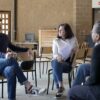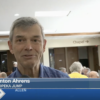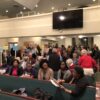April 12, 2016. Broward New Times.
Waffling, flip-flopping, failing to deliver… These are common problems among politicians.
So, once a year, churchgoers from about 20 Broward congregations come together to put those leaders on the spot. Typically they choose one issue of importance, devise a solution, and then ask the leaders publicly: Are you going to support this or not?
“They can say yes or say no — but we want them to say it in front of 1,800 people,” explains Roland Abel, copresident of the coalition, called BOLD Justice (Broward Organized Leaders Doing Justice).
This year, BOLD Justice is asking that leaders support a proposed state law that would require police departments to offer civil citations to juveniles for first-offense misdemeanors, rather than arrest them. Abel’s group was scheduled to meet last night with Broward County Sheriff Scott Israel, county commissioners Marty Kiar and Dale Holness, state Sen. Eleanor Sobel, and state Rep. Gwendolyn Clarke-Reed.
Abel explains, that the idea of the civil citation, which gives law enforcement officers the choice to make an arrest or issue a noncriminal citation — “has always been around, but the problem is, it’s not administered equally or fairly.” Last year, he says, 12,000 juveniles in Florida were arrested even though they were first-time offenders whose offenses were minor and could have been treated as civil infractions. He says 700 of these cases were in Broward County.
Still, Abel says that Israel “was the only [law enforcement official in the state] implementing [a juvenile civil citation program] with some seriousness. He is an advocate.” He noted that his group is currently working with the Hollywood Police Department to treat juveniles more leniently — that since last April, 52 kids had been put in diversion programs instead of the criminal justice system — but “cities like Plantation and Davie are not issuing citations because they don’t have to. Especially in Central and North Florida, the sheriffs [don’t want to be seen as] soft on crime.”
He says that the issue came to prominence among his group because they saw young people being saddled with criminal records early in life. “If you go into you neighbor’s yard to get a ball that you threw, that is trespassing, for example. Things that we used to do as children are now criminalized.”
His group helped draft a state law, HB 7085, that this year made it through three Senate committees and two of three House committees but failed to pass before the session ended. Abel hopes it will be reintroduced in 2017. The bill would require all circuit court systems to set up diversionary programs for “all juveniles who are alleged to have committed a delinquent act which would be a misdemeanor if committed by an adult.” It specifies certain crimes like possession of cannabis, “retail or farm theft,” and “affrays and riots.”
Abel explains that the idea for his group comes from the story of Nehemiah in the Bible. “He has a similar situation in his day, so he spoke with the rich people who were exploiting [others]. They didn’t heed, so he called this very big meeting and presented leaders with demands from poor people. There were so many people — the entire neighborhood came out, and the city — that the leaders acted correctly.”
Abel, who represents Miramar United Methodist Church, expected 1,800 people last night. He said his group is also working to protect the elderly in nursing homes and to have law enforcement officers trained to recognize mentally ill people.





